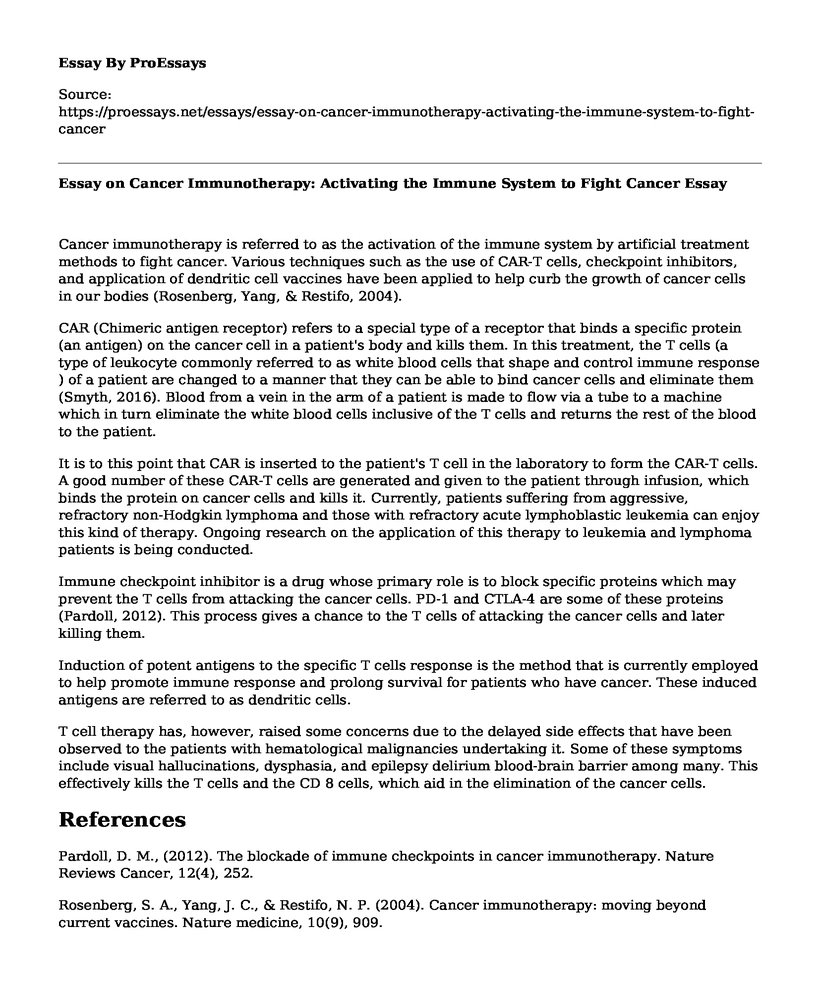Cancer immunotherapy is referred to as the activation of the immune system by artificial treatment methods to fight cancer. Various techniques such as the use of CAR-T cells, checkpoint inhibitors, and application of dendritic cell vaccines have been applied to help curb the growth of cancer cells in our bodies (Rosenberg, Yang, & Restifo, 2004).
CAR (Chimeric antigen receptor) refers to a special type of a receptor that binds a specific protein (an antigen) on the cancer cell in a patient's body and kills them. In this treatment, the T cells (a type of leukocyte commonly referred to as white blood cells that shape and control immune response ) of a patient are changed to a manner that they can be able to bind cancer cells and eliminate them (Smyth, 2016). Blood from a vein in the arm of a patient is made to flow via a tube to a machine which in turn eliminate the white blood cells inclusive of the T cells and returns the rest of the blood to the patient.
It is to this point that CAR is inserted to the patient's T cell in the laboratory to form the CAR-T cells. A good number of these CAR-T cells are generated and given to the patient through infusion, which binds the protein on cancer cells and kills it. Currently, patients suffering from aggressive, refractory non-Hodgkin lymphoma and those with refractory acute lymphoblastic leukemia can enjoy this kind of therapy. Ongoing research on the application of this therapy to leukemia and lymphoma patients is being conducted.
Immune checkpoint inhibitor is a drug whose primary role is to block specific proteins which may prevent the T cells from attacking the cancer cells. PD-1 and CTLA-4 are some of these proteins (Pardoll, 2012). This process gives a chance to the T cells of attacking the cancer cells and later killing them.
Induction of potent antigens to the specific T cells response is the method that is currently employed to help promote immune response and prolong survival for patients who have cancer. These induced antigens are referred to as dendritic cells.
T cell therapy has, however, raised some concerns due to the delayed side effects that have been observed to the patients with hematological malignancies undertaking it. Some of these symptoms include visual hallucinations, dysphasia, and epilepsy delirium blood-brain barrier among many. This effectively kills the T cells and the CD 8 cells, which aid in the elimination of the cancer cells.
References
Pardoll, D. M., (2012). The blockade of immune checkpoints in cancer immunotherapy. Nature Reviews Cancer, 12(4), 252.
Rosenberg, S. A., Yang, J. C., & Restifo, N. P. (2004). Cancer immunotherapy: moving beyond current vaccines. Nature medicine, 10(9), 909.
Smyth, M. J., Ngiow, S. F., Ribas, A., & Teng, M. W. (2016). Combination of cancer immunotherapies tailored to the tumor microenvironment. Nature reviews Clinical oncology, 13(3), 143.
Mellman, I., Coukos, G., & Dranoff, G. (2011). Cancer immunotherapy comes of age - nature, 480(7378), 480.
Cite this page
Essay on Cancer Immunotherapy: Activating the Immune System to Fight Cancer. (2023, Jan 16). Retrieved from https://proessays.net/essays/essay-on-cancer-immunotherapy-activating-the-immune-system-to-fight-cancer
If you are the original author of this essay and no longer wish to have it published on the ProEssays website, please click below to request its removal:
- The Economic Case for Letting Teenagers Sleep a Little Longer Essay
- Miss Jose's Health Condition Paper Example
- Issues Recommended Action With Supporting Rationale - Essay Sample
- Breast Cancer Prevention Program Paper Example
- El Salvador's Abortion Laws: When Is It Right to Legalize? - Essay Sample
- Social Work Code of Ethics: The NASW Standards of Professional Conduct - Essay Sample
- Annotated Bibliography on Animal Products: A Health Hazard in Today's Society







